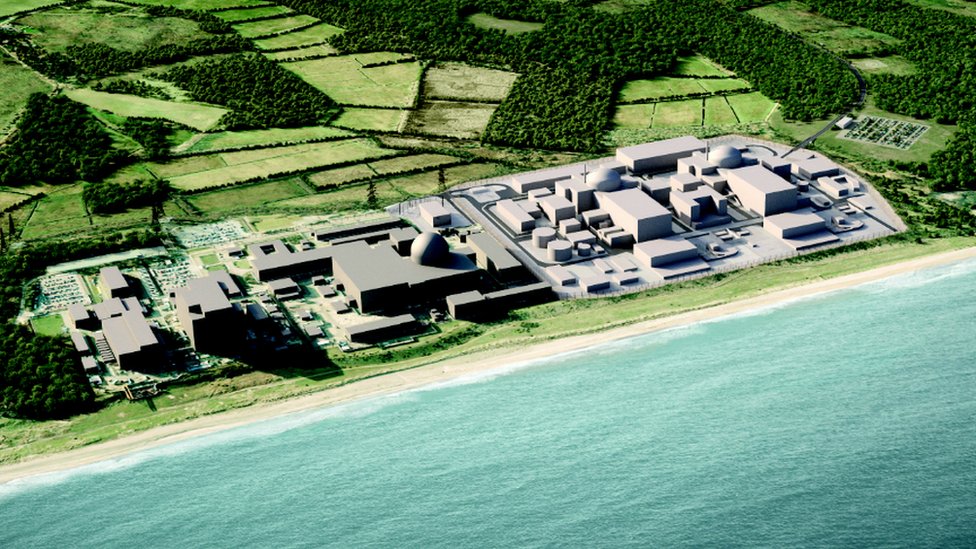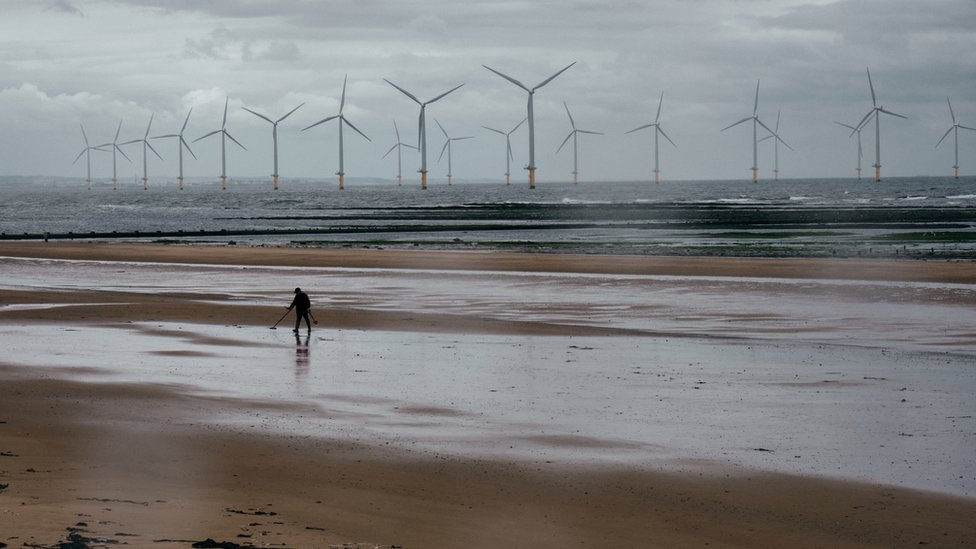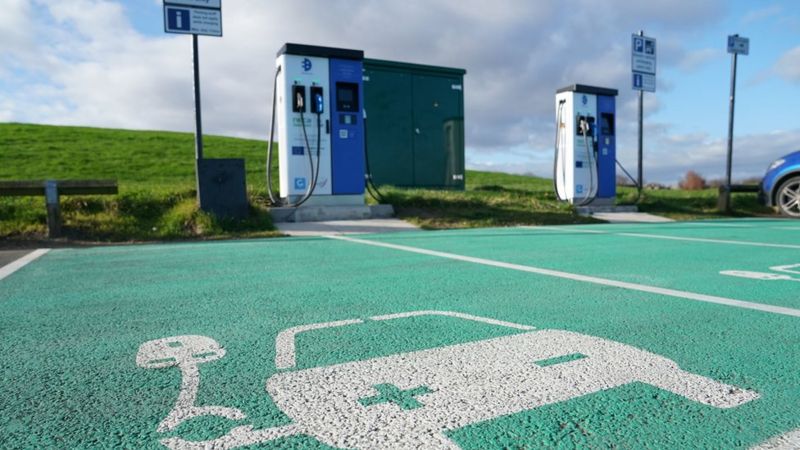New cars and vans powered wholly by petrol and diesel will not be sold in the UK from 2030, Prime Minister Boris Johnson has said.
But some hybrids would still be allowed, he confirmed.
It is part of what Mr Johnson calls a “green industrial revolution” to tackle climate change and create jobs in industries such as nuclear energy.
Critics say the £4bn allocated to implement the 10-point plan is far too small for the scale of the challenge.
The total amount of new money announced in the package is a 25th of the projected £100bn cost of high-speed rail, HS2.
Business Secretary Alok Sharma told BBC Breakfast the £4bn was part of a broader £12bn package of public investment, which “will help to bring in three times as much in terms of private sector money”.
Mr Sharma, who is president of the COP26 international climate summit that the UK will host next year, said the money would also support the creation of 250,000 jobs in parts of the UK “where we want to see levelling up”.
The government hopes that many of those jobs will be in northern England and in Wales, and that 60,000 will be in offshore wind.

PM’s 10-point plan for ‘green industrial revolution’
 IMAGE COPYRIGHTGETTY IMAGES
IMAGE COPYRIGHTGETTY IMAGES- Offshore wind: Produce enough offshore wind to power every home in the UK, quadrupling how much it produces to 40 gigawatts by 2030, and supporting up to 60,000 jobs.
- Hydrogen: Have five gigawatts of “low carbon” hydrogen production capacity by 2030 – for industry, transport, power and homes – and develop the first town heated by the gas by the end of the decade.
- Nuclear: Pushing nuclear power as a clean energy source and including provision for a large nuclear plant, as well as for advanced small nuclear reactors, which could support 10,000 jobs.
- Electric vehicles: Phasing out sales of new petrol and diesel cars and vans by 2030 to accelerate the transition to electric vehicles and investing in grants to help buy cars and charge point infrastructure.
- Public transport, cycling and walking: Making cycling and walking more attractive ways to travel and investing in zero-emission public transport for the future.
- Jet zero and greener maritime: Supporting research projects for zero-emission planes and ships.
- Homes and public buildings: Making homes, schools and hospitals greener, warmer and more energy efficient, including a target to install 600,000 heat pumps every year by 2028.
- Carbon capture: Developing world-leading technology to capture and store harmful emissions away from the atmosphere, with a target to remove 10 million tonnes of carbon dioxide by 2030 – equivalent to all emissions of the industrial Humber.
- Nature: Protecting and restoring the natural environment, with plans to include planting 30,000 hectares of trees a year.
- Innovation and finance: Developing cutting-edge technologies and making the City of London the global centre of green finance.

The plan includes provision for a large nuclear plant – likely to be at Sizewell in Suffolk – and for advanced small nuclear reactors, which it is hoped, will create an estimated 10,000 jobs at Rolls-Royce and other firms.
 IMAGE COPYRIGHTEDF
IMAGE COPYRIGHTEDFThe plans will also affect some people’s homes.
The government will bring forward, to 2023, the date by which new homes will need to be warmed without using gas heating.
It will aim to install 600,000 heat pumps a year by 2028 – these are low-energy electrical devices for warming homes.
And it has extended the Green Homes Grant for home insulation for a year after the first tranche was massively over-subscribed.
Clean hydrogen will be blended into the natural gas supply to reduce overall emissions from gas, and the government wants a town to volunteer for a trial of 100% hydrogen for heat, industry and cooking.
The hydrogen – attracting a subsidy of up to £500m – will be produced in places such as the North East of England, partly by energy from offshore wind.
 IMAGE COPYRIGHTGETTY IMAGES
IMAGE COPYRIGHTGETTY IMAGESThe government wants to breathe new life into de-industrialised areas by teaming hydrogen production with the manufacture of wind turbines, and with four clusters of firms using carbon capture and storage.
This is when emissions from chimneys are captured and forced into rocks underground. The hope is to transform depressed areas into hi-tech hubs. This will get funding of an extra £200m.
Another key point of the plan is a £1.3bn investment in electric vehicle (EV) charging points. Grants for EV buyers will stretch to £582m to help people make the transition.
There is also nearly £500m for battery manufacture in the Midlands and the north-east of England.
Many of the details of the plan will be written into an energy white paper proposing future legislation, which is expected by the end of the month.
In the race to clean up motoring, the UK is now in second place after Norway, which has a fossil fuel vehicle abolition date of 2025.
UK car makers have warned about the scale of the challenge, but the government believes that forcing technological change can give firms a competitive edge.
But will the so-called “green revolution” achieve its aim of massive job creation?
Experts said the £4bn would go a long way if it were spent on labour-intensive insulation, but not far if ploughed into expensive, mechanised carbon capture.
The prime minister said: “My 10-point plan will create, support and protect hundreds of thousands of green jobs, whilst making strides towards net zero by 2050.
“Our green industrial revolution will be powered by the wind turbines of Scotland and the North East, propelled by the electric vehicles made in the Midlands and advanced by the latest technologies developed in Wales, so we can look ahead to a more prosperous, greener future.”
Mr Johnson said his plans aimed to create jobs and address climate change at the same time.
The UK will host the COP26 UN summit – seen as the most important round of talks to tackle climate change since the Paris Agreement in 2015 – in Glasgow this time next year. It had been due to take place in 2020 but was postponed by 12 months because of the pandemic.
The plans are aimed to put the UK on track to meet its goal of net zero emissions by 2050.
‘Falls well short’
Shadow business secretary Ed Miliband criticised the plan, saying that the funding “in this long-awaited” announcement does not “remotely meet the scale of what is needed” to tackle unemployment and the climate emergency.
“Only a fraction of the funding announced today is new.”
Mr Miliband, who served as energy and climate change secretary from 2008-10, said Labour wanted the government to bring forward £30bn of capital investment over the next 18 months and invest it in low-carbon sectors to support 400,000 additional jobs.
And Green Party MP Caroline Lucas welcomed some measures but said the plan “completely fails to rise to the gravity of this moment”.
“When you put it in the context of the scale of the climate and nature emergencies that we face, and indeed the scale of the job emergencies that we face, then it’s nowhere near ambitious enough, it’s not urgent enough, it’s not bold enough,” she told BBC Radio 4’s Today programme.
She criticised the £4bn allocation, saying “the resources aren’t there in order to make this a really strategic package”.
Ms Lucas also said the government’s message is “inconsistent” and it must make clear which technologies it wants to invest in.
She said nuclear power is “massively costly”, will not be “on stream” until the middle of the 2030s, and risks undermining focus on offshore wind.
The Green Party called for a transformation of the entire economy to reduce emissions, including scrapping the £27bn road-building programme, which will actually increase emissions.
However, Alistair Phillips-Davies, chief executive of energy supplier SSE, told the Today programme he was pleased “to see this level of ambition from the government”.
He said the plan was “a really important step in getting the green recovery going” and would “help create a lot more jobs”.
Mike Hulme, professor of human geography at the University of Cambridge, said critics should not “nit-pick about precise details” of the plan as it was “far more important is to endorse the direction of travel that has been set for the next decade”.
Tanya Steele from WWF-UK said the government had “fired the starting gun on the action we need to see”.
She added: “We now need the chancellor to live up to the ambition expressed today through a spending review that tests every line of public spending to ensure it’s compatible with meeting our climate goals.”



